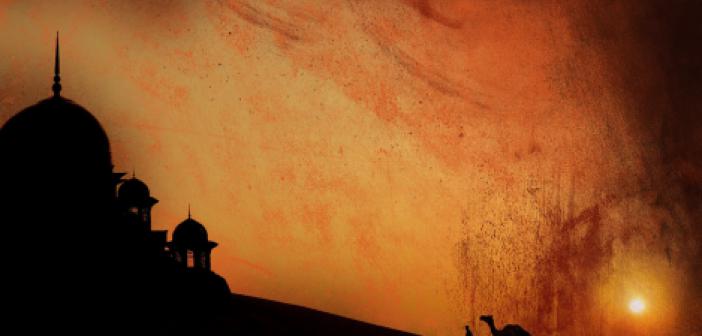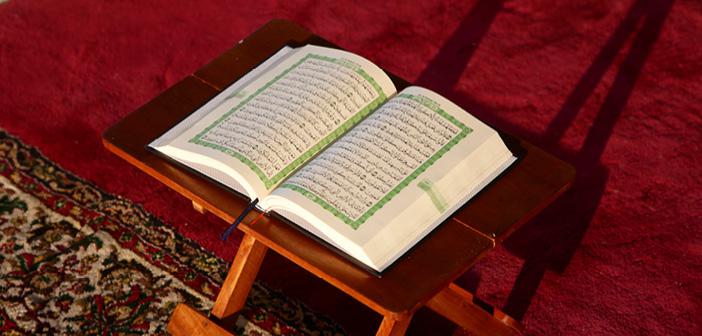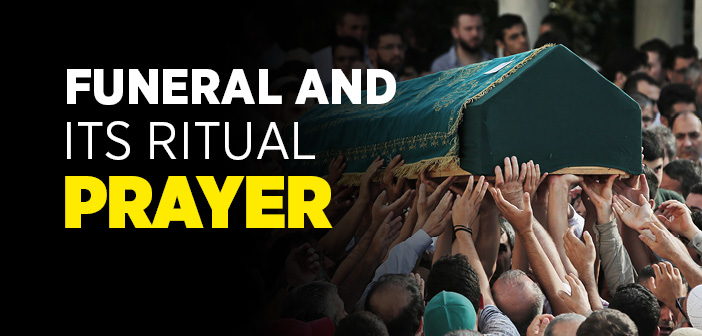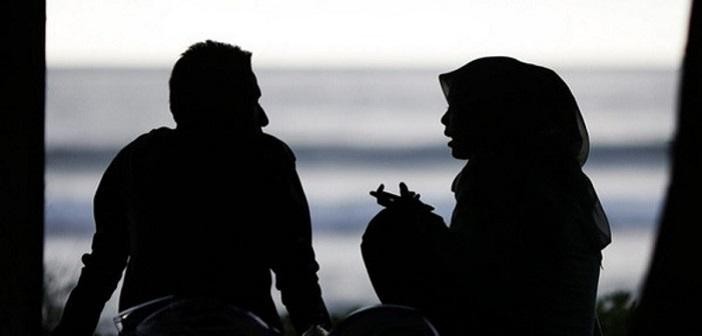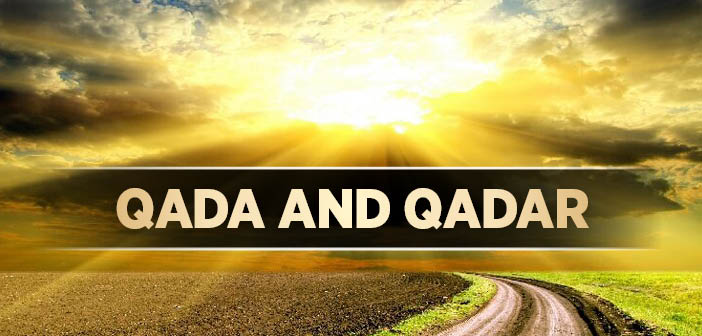
Definition of Qada and Qadar
What is the definition of qada? What is the definition of qadar? What does qada mean in islam? What is belief in qada and qadar?
Qadar literally means “measure, quantity, doing and determining something according to a certain measure”. As a term, it means that Almighty Allah knows the place, time, forms, and all kinds of features of all things that have happened and will happen from pre-eternity to eternity and that He decrees and wills them based on this knowledge. Therefore, the divine decree (sometimes inaccurately known as predestination and fate in English) is a requirement of Allah’s attributes of knowledge and will. Almighty Allah, with the attribute of knowledge, knows everything that has happened and will happen in all its details, and with the attribute of will, He chooses, determines, and decrees how and with what features it will happen. So, the knowledge of something by Allah in the pre-eternity and choosing and decreeing it in accordance with this knowledge is called “qadar (divine decree)”. In other words, the divine decree is Allah’s pre-eternal judgment and decision regarding what will happen. According to Allah’s will, this applies to all beings. This eternal decree, written in the Lawḥ al-Maḥfūz, comes true when the time comes for its implementation.
Qaḍā is the creation of the things that Allah has determined and decreed on His knowledge in pre-eternity, in accordance with His knowledge and will, when the time comes for their realization. Qaḍā is the manifestation of Allah's attributes of “qudrah (power)” and “takwīn (create)”. Allah creates the things that will happen, when the time comes, with the attributes of “qudrah (power)” and “takwīn (create)” in accordance with the plan of divine decree.
In the realm of beings, everything is connected to qaḍā and qadar. Nothing can happen outside of Allah’s will and decree. In short, qadar (divine decree) is the total existence of all beings in the Lawḥ al-Maḥfūz as eternal knowledge of Allah, before they even come into existence. Qaḍā (divine will), on the other hand, is that they happen one by one when the time comes.
These definitions are according to Imam Māturīdī, who is the imam of one of the creedal denominations in Islam. Imam Ash’arī, who is the imam of the other creedal denomination, adopted what the Māturīdīs defined as qadar (divine decree) as qaḍā (divine will), and what the Māturīdīs call qaḍā (divine will) as qadar (divine decree).
A-) Evidence Regarding Qada and Qadar And Its Scope
Everything that has happened and will happen is by Allah’s qaḍā and qadar. This is among the tenets of Islam. Because Allah’s knowledge, will and power to create encompass all beings and events. Some of the verses on which qaḍā and qadar are based are as follows:
“…Every single thing is before His sight, in (due) proportion..”[1], “…it is He who created all things, and ordered them in due proportions.”[2], and “Say: “Nothing will happen to us except what Allah has decreed for us: He is our protector”…”[3] Accordingly, even if all people try to help someone, they cannot do so unless Allah wills it. Again, even if they try to harm someone, they will not be able to do it unless Allah wills it. The following is stated in the Qur’an: “If Allah touches you with affliction, none can remove it but He; if He touches you with happiness, He has power over all things.”[4] There are many verses such as these that directly or indirectly state that all events in the universe and on earth take place within a measure.[5]
In the hadith known as the hadith of Jibril, the Prophet (saw) counted belief in qadar (divine decree) among the principles of faith. According to this hadith, the Prophet (saw) asked Jibril (as), “What is faith?” He gave the following answer to the question: “It is your belief in Allah, His angels, His books, His prophets, the Last Day, and destiny with its good and evil.” Jibril (a.s) approved this answer.[6]
On the other hand, knowing the difficulty of understanding divine decree in all its aspects, the Prophet warned the Companions who were discussing this issue among themselves and said: ““Is this what I ordered you to do?” or “Is this what I have been sent to you with? The people before you were only ruined when they differed about this matter.”[7]
In addition to these unknown aspects of destiny, the Prophet, taking into account the human will, explained the effect of destiny on human life as follows: “Verily your creation is prudent. The constituents of one of you are collected for forty days in his mother's womb in the form of blood, after which it becomes a clot of blood in another period of forty days. Then it becomes a lump of flesh and forty days later Allah sends His angel to it with instructions concerning four things, so the angel writes down his livelihood, his death, his deeds, his fortune, and misfortune. By Him, besides Whom there is no god, that one amongst you acts like the people deserving Paradise until between him and Paradise there remains but the distance of a cubit, when suddenly the writing of destiny overcomes him and he begins to act like the denizens of Hell and thus enters Hell, and another one acts in the way of the denizens of Hell until there remains between him and Hell a distance of a cubit that the writing of destiny overcomes him and then he begins to act like the people of Paradise and enters Paradise.”[8] In other narrations, it is stated that the angel will come when the fetus is forty-two days old, and in addition to the four items above, the child’s organs will be created, and the child’s gender, physical, and health status will be determined.[9]
According to the verses and hadiths above, it is understood that a determined life is given to the child while he is in the process of formation in the mother’s womb and that there is a destiny in his biological creation. In fact, the Prophet said that doing good deeds for a lifetime would take a person to heaven, and then when he is one cubit away from heaven, committing one sin that would take him to hell, can change the result; or committing a lifetime of sin that would take the person to hell and then doing one good deed that would lead to the paradise can change the result and all this because of what is written in the womb. A Companion asked, “Since our destiny is written, why do we need to act?” Allah’s Messenger replied: “Do good deeds! Everyone is given the opportunity. For the people of felicity, the deeds of the people of felicity are facilitated. And for the wretched, the deeds of the wretched are facilitated.” Then he recited the following verse: “So he who gives (in charity) and fears (Allah), And (in all sincerity) testifies to the best, We will indeed make smooth for him the path to Bliss. But he who is a greedy miser and thinks himself self-sufficient, And gives the lie to the best, We will indeed make smooth for him the path to Misery;”[10]
In this world, human beings are able to do things within the limits determined by destiny. This is not a compulsion of will. That is, no human being can be forced through his own will and a deed is realized within the limits of the human will. However, Allah’s will, creation, and decree of destiny also take place in accordance with this deed.
In terms of responsibility, human actions are divided into two; voluntary and involuntary. Since acts and actions that are involuntary happen only by Allah’s creation, without a person’s own free will, humans are not held responsible for them. Things like the circulation of blood in the body, the functioning of various internal organs, and the feeling of hunger are of this nature. There is no merit or sin in such elements.
Voluntary actions, on the other hand, are created on the basis of human choice and will. People have a certain partial will and power in this regard. The human being uses his own will and power for a certain deed, and Allah Almighty creates this deed in the direction of his will. The human being cannot create his own deed but no force and coercion are involved since the use of will and power come from the human being.
Moreover, Allah Almighty has connected everything that happens or will happen to causes. The human being holds on to such causes, and Allah creates that thing. The divine sunnah continues in this way. For example, a person who performs ablution and turns to prayer uses his will in that direction and shows his power. As a result of the use of will and power, Allah creates the act of performing ablution and then praying. The fact that this ablution and prayer is known by Allah in the pre-eternal knowledge constitutes “destiny”.
In short, a person does not commit good or bad deeds because they were written and decreed in the pre-eternity. Since Allah knows that the human being will do good or bad by his own will, it has been written in that form in Lawḥ al-Maḥfūz. For this reason, the human being is held responsible for the good and evil actions he carries out.
B-) Abu Ḥanifa’s View of Qadar And Qada
Abu Ḥanīfa said that destiny was written in Lawḥ al-Maḥfūz “by qualification”. According to him, everything in the world and the hereafter occurs by Allah’s knowledge, predetermination, qaḍā, qadar, and by writing on Lawḥ al-Maḥfūz. All evil, disobedience, obedience, action, will, and everything else is written down in the Lawḥ al-Maḥfūz with their attributes. This writing is not an abstract form, but rather it is held together with a cause and effect relationship. For example; “Ali will live as a believer in the world, will do good deeds, and as a result, he will go to heaven”, again the statements that “Hasan will live in the world without faith, will do evil through his own will, and will eventually go to hell” are examples of writings by qualification. Otherwise, it is not written “Let Ali be a believer” or “Let Hasan be a disbeliever”. For that would be a compulsion of will, but since a person commits his actions with his own will, he is considered responsible.[11]
C-) Does Destiny Change?
Allah Almighty determined destiny in detail and wrote it in Lawḥ al-Maḥfūz. It is up to Him to make any changes in it. The Qur’an states: “Allah does blot out or confirm what He pleases: with Him is the Mother of the Book.”[12]
According to this verse, Allah the Exalted abrogates the decree He wishes to abrogate, replaces it with whatever He wishes, or keeps it intact by not abrogating it. He can decree death or life for those whose time of death is approaching. Ahmad Ibn Mubarak said: I asked my illiterate mentor Abdulazīz al-Dabbāgh about the interpretation of this verse, and he gave me the following answer: “What is meant by “blotting out” is that some of the things that will happen in the future, such as rain falling, someone coming, the occurrence of that event do not occur, but “Allah erases it”; Some of them, on the other hand, occur, which is what is meant by “creates”.”[13]
What is called “the Mother of the Book” in the above verse is Lawḥ al-Maḥfūz, destiny, and pre-eternal divine knowledge. What has changed is a qaḍā.
When one day the Prophet walked fast while passing by a building that was about to collapse, he was asked, “O Messenger of Allah, are you running away from Allah’s qaḍā?” he replied, “I seek refuge in Allah’s qadar from Allah’s qaḍā”. When ‘Umar went to Damascus, he heard that there was a plague there, and he returned. When he was asked a similar question, he replied: “I seek refuge in Allah’s qadar from Allah’s qaḍā.”
It is narrated that ‘Umar invoked Allah for a change of destiny with the following words: “O Allah! If you wrote my name among the wretched, erase my name from there. If you wrote it among the people of felicity, make it stay there. Because You said “Allah does blot out or confirm what He pleases: with Him is the Mother of the Book” and Your word is truth.”[14]
In conclusion, it is natural that Almighty Allah, who created all beings from nothing and rules the universe with the most delicate balance, knows everything, how it will happen, and the situations and forms that it could take in the future, and decrees them in His pre-eternal knowledge.
[1] Al-Raʿd, 13: 8.[2] Al-Furqān, 25: 2.[3] Al-Tawba, 9: 51.[4] Al-Anʿām, 6: 17.[5] See al-Zumar, 39: 62; al-Ṣaffāt, 37: 96; al-Aʿrāf, 7: 178; al-Wāqi’a, 56: 60 etc.[6] Muslim, Imān, 1; Abu Dawūd, Sunnah, 15; Ibn Maja, Muqaddimah, 9.[7] Al-Tirmidhī, Qadar, 1.[8] Al-Bukhari, Bad’ al-khalq, 6, Anbiya, 1, Qadar, 1; Muslim, Qadar, 1; Abu Dawūd, Sunnah, 16; al-Tirmidhī, Qadar, 4; Ibn Maja Muqaddimah, 10.[9] Muslim, Qadar, 3, 4; Ibn Maja, Muqaddimah, 7; Ibn Ḥanbal, I, 374, II, 176, III, 397.[10] Al-Layl, 92: 5-10. See al-Bukhari, Bad’ al-khalq, 6; Muslim, Qadar, 1.[11] Abu al-Muntaha, Sharḥ al-Fiqh al-Akbar, Istanbul 1308. Quoted from p. 11, Umar al-Nasafī, Aqāid, p. 143, 144[12] Al-Raʿd, 13: 39.[13] Hasan Basri Çantay, Meal, I, 375, footnote 29.[14] S. Vehbi Efendi, Majmu‘at al-Maārif, Konya, 1327, p. 123.
Source: Basic Islamic Principles (ʿilmi ḥāl) According to the Four Sunni Schools With Evidence From The Sources of Islamic Law, Prof. Hamdi Döndüren, Erkam Publications



